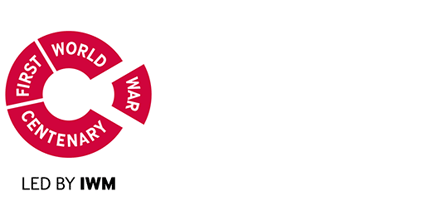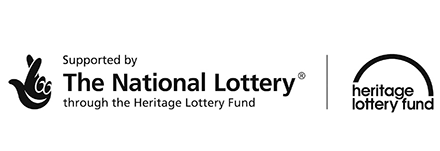Timeline
The following provides a timeline of key events in Bristol, nationally and overseas during the First World War, as well as dates for some of the other conflicts over the past 100 years which have involved British troops. Please choose the date you would like to view from the tabs below.
Our thanks to Eugene Byrne for researching and compiling most of the information used here, and to Amy O'Beirne for checking the draft content.
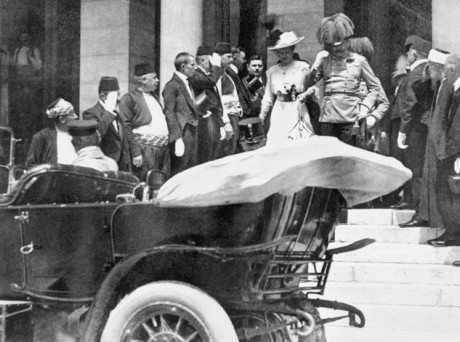
Events of particular relevance to Bristol area are shown in red.
Jun 28 1914: Assassination of Archduke Franz Ferdinand, Sarajevo.
Jul 28 1914: Austria-Hungary declares war on Serbia. Russia mobilizes.
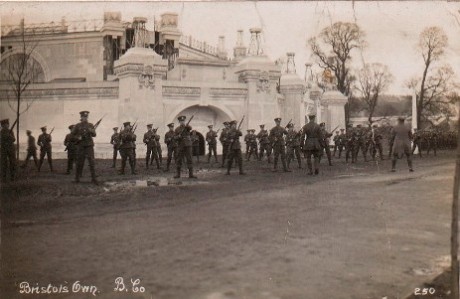
Aug 1 1914: Germany declares war on Russia.
Aug 1 1914: Military stores begin to arrive at Avonmouth.
Aug 2 1914: Germany invades Luxembourg.
Aug 3 1914: Germany declares war on France.
Aug 4 1914: Germany invades Belgium. Britain declares war on Germany.
Aug 7 1914: First elements of British Expeditionary Force (BEF) arrive in France.
Aug 8 1914: 4th and 6th Battalions of Glosters (Territorial Force) leave colours at the Council House.
Aug 11 1914: France declares war on Austria-Hungary.
Aug 12 1914: UK declares war on Austria-Hungary.
Aug 12–14 1914: Bulk of BEF arrives in France; c. 4,600 men and a lot of vehicles and equipment from Avonmouth.
Aug 13 1914: Colston Hall opens as recruiting office.
Aug 15 1914: International Exhibition at White City closes.
Aug 17 1914: First meeting of Bristol Citizens Recruiting Committee.
Aug 21 1914: Bristol Board of Guardians offers its new infirmary at Southmead to War Office.
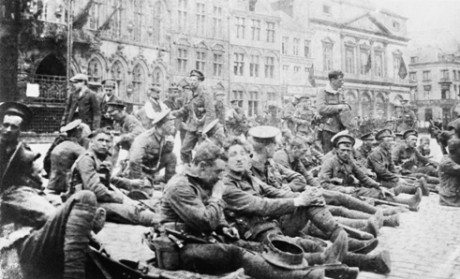
Aug 23 1914: Battle of Mons.
Aug 23–30 1914: Germany defeats Russians at Battle of Tannenberg.
Aug 26 1914: Daily Express publishes ‘The Day’ poem by Bath railway porter Henry Chappell.
Aug 26 1914: Date of action for which Bristol-born Douglas Reynolds, Royal Field Artillery, awarded Victoria Cross.
Aug 26–27 1914: Battle of Le Cateau.
Aug 31 1914: Kitchener approves formation of a Bristol battalion (12th Glosters).
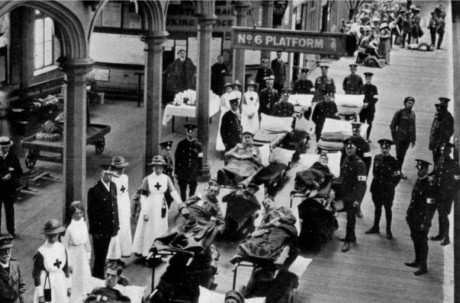
Sep 1914: Remount Depot begins setting up, Shirehampton.
Sep 1 1914: Busiest day at temporary recruiting centre at Colston Hall - 440 men volunteer.
Sep 2 1914: First ambulance train of First World War arrives Temple Meads from Southampton with wounded BEF from Mons.
Sep 5–12 1914: First Battle of the Marne. The German advance on Paris is halted.
Sep 9 1914: Maiden flight of Barnwell's Bristol Fighter, which will go on to equip 17 squadrons on the Western Front.
Sep 13–28 1914: The First Battle of the Aisne ends. Race to the Sea begins.
Oct 1914: All Germans resident in Bristol who are not naturalised sent to internment camps.
Oct 18 1914: First Canadian troops arrive in Bristol.
Oct 22 1914: First Belgian refugees arrive in Bristol.
Oct 19–Nov 22 1914: The First Battle of Ypres ends the Race to the Sea.
Nov 2014: 5,000 Scottish troops arrive in Bristol.
Nov 2014: Death at Ypres of Captain A E J Collins (pupil at Clifton College when he achieved the highest ever recorded score in cricket).
Nov 1 2014: Local Election Day, Bristol, but all elections cancelled for duration and vacant seats filled by co-option of members with views as close as possible to previous occupant.
Nov 1 2014: Battle of Coronel. Von Spee's German cruiser squadron defeats a Royal Navy squadron.
Nov 2 2014: Britain begins naval blockade of Germany.
Nov 5 2014: France and UK declare war on the Ottoman Empire.
Nov 20 2014: Date of action for which Thomas Rendle, Duke of Cornwall’s Light Infantry, awarded VC.
Dec 8 1914: Battle of the Falklands. Von Spee’s German cruiser squadron defeated by the Royal Navy.
Dec 9 1914: Concert of New Philharmonic Society – choir about to sing Stanford’s ‘Songs of the Fleet’ (words by H Newbolt, educated Clifton College) as news arrives of Falklands victory.
Dec 16 1914: German fleet shells Scarborough, Whitby and Hartlepool
Dec 17 1914: Likely date of arrival of first ship with animals for Remount Depot at Avonmouth. Asian, 5,614 tons, with around 870 mules. Most herded to depot by road.
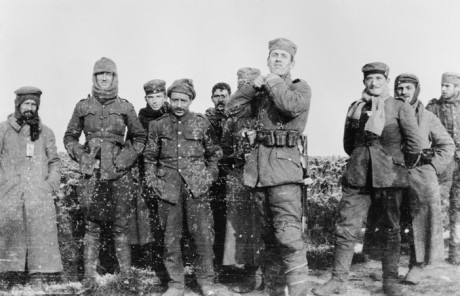
Dec 24–25 1914: Unofficial Christmas truce is observed between German and British forces on some sectors of Western Front.
Image information: Archduke Franz Ferdinand (centre in plumed hat), the heir to the throne of Austria-Hungary, descends the steps of the town hall in Sarajevo with his wife Sophie on 28 June 1914. Minutes later, both were shot dead by Gavrilo Princip. Imperial War Museum/ Centenary Partnership Programme ref Q 3255.
'Receiving Wounded at Temple Meads Station'; reproduced from Bristol and the Great War: 1914-1919 (1920), editors George F Stone and Charles Wells. Bristol Record Office ref Bk/765, scanned by John Penny.
Bristol’s Own (12th Battalion Gloucestershire Regiment) training at the White City exhibition site. Vaughan Collection/ Bristol Record Office ref 43207-8-064.
Men of the 4th Battalion, Royal Fusiliers rest in the Grand Place in Mons on 22 August 1914. Imperial War Museum/ Centenary Partnership Programme ref Q70071.
Second Lieutenant Cyril Drummond took this photograph of soldiers from the Royal Warwickshire Regiment talking happily with men from the 134th Saxon Regiment on Boxing Day 1914. Imperial War Museum/ Centenary Partnership Programme ref HU 35801.
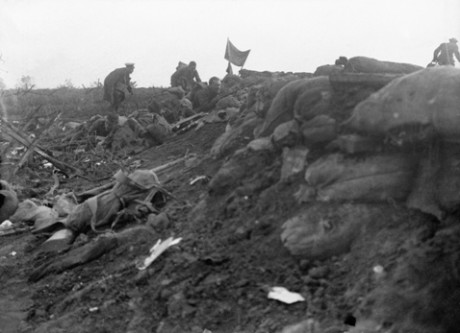
Events of particular relevance to Bristol area are shown in red.
Jan 1 1915: New Year’s Council meeting notes that 1914 saw lowest crime rates in 40 years.
Jan 19 1915: First Zeppelin raid on Great Britain; Germans bomb Great Yarmouth and King’s Lynn.
Jan 24 1915: Battle of Dogger Bank between squadrons of British and German navies.
Feb 4 1915: Germany begins submarine warfare against merchant vessels.
Feb 10 1915: Count Eugene Goblet D’Alviella, Belgian minister, visits and thanks city for treatment of refugees.
Feb 19 1915: Gallipoli campaign starts with British and French naval attack on the Dardanelles.
Feb 28 1915: Grantully Castle is one of ships taking the Naval Division from Avonmouth to Dardanelles. On board are Arthur Asquith and Rupert Brooke.
Mar 1915: All Saints Clifton parish magazine publishes what’s thought to be first account of the Angels of Mons.
Mar 10–13 1915: Battle of Neuve Chapelle. British offensive halted after initial success. First time UK public made aware of horrors of war, and of shell problem.
Apr 1915: War office approves formation of 14th Battalion Glosters of men 5’ to 5’3” (1.52-1.60m) – “West of England Bantams”.
Apr 15 1915: King takes the pledge. Disappointed that so few other public figures follow his example.
Apr 21 1915: Black Watch (3rd Battalion, Royal Regiment of Scotland) leaves Bristol. Have been very popular with locals.
Apr 22–May 25 1915: Second Battle of Ypres. Stalemate. Germany first uses the poison gas.
Apr 25 1915: Allied forces land on Gallipoli, landing at Anzac Cove and Cape Helles.
May 7 1915: The British liner Lusitania sunk by German U-boat. Anti-German riots in some parts of country.
May 15–25 1915: Battle of Festubert. Limited British success.
May 23 1915: Italy declares war on Austria-Hungary.
May 25 1915: Lloyd George appointed Minister of Munitions.
May 24 1915: Empire Day marked with parade of 5,000 soldiers from Queen Square to Durdham Down. VC recipient Rendle is star attraction.
May 24 1915: First wounded men arrive at Beaufort (the Bristol Lunatic Asylum) following conversion to war hospital.
May 25 1915: Formal farewell to Bristol’s Own at Colston Hall. They leave for more training in Yorkshire in June.
May 31 1915: First Zeppelin raid on London.
Jun 2 1915: New Territorial Force Regimental HQ and drill hall opened in Old Market.
Jun 28 1915: SS Armenian, with 1,400 mules Avonmouth bound, sunk off Cornwall. Many of crew killed are American.
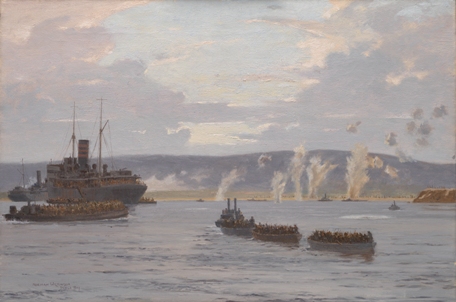
Aug 6-15 1915: Allies land at Suvla Bay.
Aug 10 1915: New restrictions on alcohol, treating, licensing hours etc. come into force.
Aug 13 1915: George Joseph Smith, ‘Brides in the Bath Killer’, hanged, Maidstone Gaol.
Aug 13 1915: HMT Royal Edward torpedoed in Aegean. Most of 220 officers and crew signed on in Bristol.
Aug 19 1915: First naval engagement of HMS Baralong with German U-boats (the merchant ship Nicosian which was under threat from the U-boats was Bristol-bound).
Aug 19 1915: New York City, biggest ship of Bristol City Line, sunk SE of Fastnet Lighthouse. All crew saved.
Sep 6-11 1915: Trades Union Congress meets in Bristol. Lloyd George comes to address it to persuade unions to get behind war effort, especially munitions production.
Sep 7 1915: King and Queen pay surprise visit to Bristol military hospitals and Remount Depot.
Sep 15–Nov 4 1915: Third Battle of Artois.
Sep 25–28 1915: Major British offensive at Loos fails.
Oct 1915: Training squadron of Royal Flying Corps formed at Filton. Later two squadrons.
Oct 12 1915: Execution of Nurse Edith Cavell.
Oct 27 1915: French, British and Italian troops land at Salonika to open Balkan front.
Nov 1915: W J Davey, turned down as a recruit as he only has one leg, is given a job at the Remount Depot after appealing to the King.
Nov 1915: Frederick Eagles, landlord of Cat & Wheel, Castle Green, is fined £5 in first prosecution in Bristol under wartime law against 'treating' (paying for another person’s drink).
Nov 9 1915: Bristol City Council adopts resolution pledging full support of war effort. Walter Ayles (Lab) abstains. Other Labour members enthusiastically support the motion.
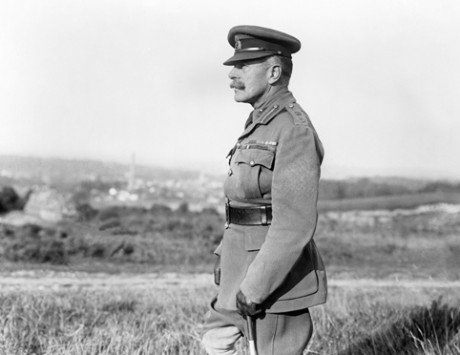
Dec 6 1915: John McCrae’s ‘In Flanders Fields’ published anonymously in Punch.
Dec 19 1915: Douglas Haig replaces Sir John French as commander of the British Expeditionary Force.
Dec 21 1915: Church of England Men’s Society opens ‘rest house’ in Victoria Street for soldiers. Open 24 hours.
Image information: Men of the 1/10th Battalion, King’s (Liverpool Regiment), known as the Liverpool Scottish, in the middle of an attack at Bellewaarde outside Ypres on 16 June 1915. Photograph taken by Private Fred Fyfe, a pre-war press photographer, as he lay wounded. Imperial War Museum/ Centenary Partnership Programme ref Q49750.
Norman Wilkinson ‘The Landing in Suvla Bay: Early Morning, 7th August 1915’ (1918) Oil on canvas. Imperial War Museum/ Centenary Partnership Programme ref IWM ART 2451.
Field Marshal Sir Douglas Haig was Commander-in-Chief of the British Expeditionary Force from December 1915 until the end of the war. He was educated at Clifton College, Bristol. Imperial War Museum/ Centenary Partnership Programme ref Q3255.
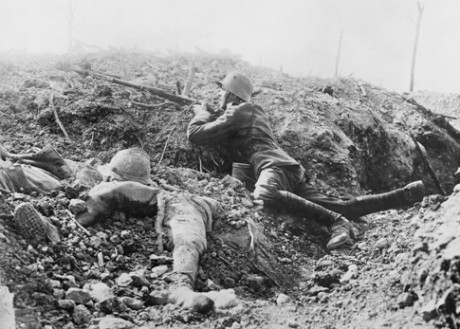
Events of particular relevance to Bristol area are shown in red.
Jan 9 1916: Gallipoli Campaign ends in an Allied defeat. Last evacuation on Jan 8.
Jan 26 1916: Labour Party conference in Bristol backs war but condemns conscription. Some days previously a conference of Labour women was held where conference president Dr Marion Philips said women are pacifist by nature but must stand up to Germany, although one motion demanded an end to the war.
Jan 27 1916: Conscription of single men aged 18-41 introduced in Britain Military Service Act. Extended to married men in May.
Feb 1916: Council’s Insurance Committee reports drop in number of free school meals in Bristol and lower sickness rates due to full employment and higher wages.
Feb 21 1916: The Battle of Verdun begins.
April 24 1916: Easter Rising by Irish rebels, Dublin. Unconditional surrender agreed April 29.
May 10 1916: Germany suspends unrestricted submarine warfare.
May 20 1916: Freedom of Bristol conferred on W. Hughes, PM of Australia, and Sir Thomas Mackenzie, New Zealand High Commissioner.
May 21 1916: Daylight Saving comes into force with Summer Time Act. From here to Sept 30 clocks run one hour ahead of GMT.
May 31–Jun 1 1916: Battle of Jutland.
Jun 5 1916: HMS Hampshire is sunk off the Orkney Islands en route to negotiations with the Russians; Lord Kitchener, Secretary of State for War, among those killed. Philip Alexander, the founder of 1st Downend Scout troop, was also on board and among those who lost their lives.
Jun 20 1916: Council welcomes party from 14th Glosters (Bantams) who present a captured German machine gun to city.
Jul 1 1916: Somme offensive begins.
Jul 3 1916: First casualties of Somme arrive at Temple Meads from Southampton at 4.30 a.m.
Aug 15 1916: Everyone in city to be registered under 1915 National Registration Act. Bristol divided into 805 Registration districts and volunteers hand out and collect forms. 87,661 males and 131,107 females enumerated.

Sep 3 1916: 12th Battalion of the Gloucestershire Regiment ("Bristol's Own") take part in Somme with attack on a strongly held position at Guillemot; 324 men killed or wounded.
Sep 9 1916: Clerk to Magistrates reports that for first time in 20 years there is no list of offenders. In accordance with custom, he presents the duty magistrates with a pair of white gloves.
Sep 10 1916: Police stop and question all men of military age not in uniform on Durdham Down.
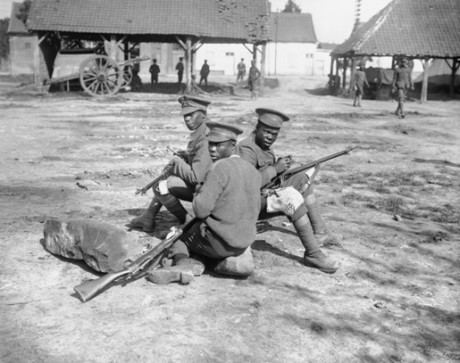
Sep 15–22 1916: Battle of Flers-Courcelette in Somme offensive. British use tanks for the first time.
Sep 21 1916: Jack Cornwall’s Day marked in Bristol schools in honour of young Jutland hero.
Sep 26–28 1916: Battle of Thiepval Ridge, Somme offensive.
Oct 20 1916: Pieces of shot-down Zeppelin auctioned in Bristol for charity.
Oct 24 1916: French recapture Fort Douaumont near Verdun.
Nov 1916: Bristol councillor Walter Ayles arrested at an anti-conscription rally in Glasgow. As a pacifist he is exempted from military service on grounds of conscience, but must do work of “national importance” to support the war effort. He refuses and is handed over to the military authorities, remaining in prison until 1919.
Nov 13–18 1916: Battle of the Ancre (closing phase of Battle of Somme).
Nov 18 1916: The Battle of the Somme ends.
Nov 22 1916: Death of Sir George White, founder of Bristol Aeroplane Company.
Dec 5–Dec 7 1916: Prime Minister Asquith resigns, succeeded by David Lloyd George.
Dec 20 1916: First women tram conductors begin work in Bristol. Not popular; boys throw things at them; a 14-year old is prosecuted at Children’s Court two months later.
Images information: A German soldier takes aim, surrounded by French dead, at Verdun. Imperial War Museum/ Centenary Partnership Programme ref Q23760.
‘Somme Battle 25 Sept 1916, Bristol Troops (12th Gloucesters) moving up in support’ reproduced from Bristol and the Great War: 1914-1919 (1920), editors George F Stone and Charles Wells. Bristol Record Office reference Bk/765, scanned by John Penny.
Troops of the West Indies Regiment cleaning their rifles on the Albert - Amiens road, September 1916. Imperial War Museum/ Centenary Partnership Programme ref Q 1201.

Events of particular relevance to Bristol area are shown in red.
Jan 12 1917: Conference on future relations of labour and capital held in Bristol, organised by Dr Cyril Norwood, head of Bristol Grammar School. Recommends all employees join a union.
Jan 15 1917: Fire destroys Wathen Gardner clothing factory at Staple Hill.
Jan 30 1917: Anarchist/socialist Alice Wheeldon and family of Derby arrested and later convicted of conspiracy to poison Lloyd George. The evidence was shaky and she was released at the end of the year.
Feb 1 1917: Germany resumes unrestricted submarine warfare.
Feb 23–Apr 5 1917: Germans withdraw to the Hindenburg Line.
Mar 1917: Section of 128th Battalion Canadian Regiment known as Moosejaws (from home town) visit Bristol and leave colours here, ceremonially handed to Lord Mayor on Council House steps. Many in regiment have Bristol connections.
Mar 1917: Tramways Company AGM told 800 women are now working for firm in place of men who have gone to war.
Mar 11 1917: British capture Baghdad.
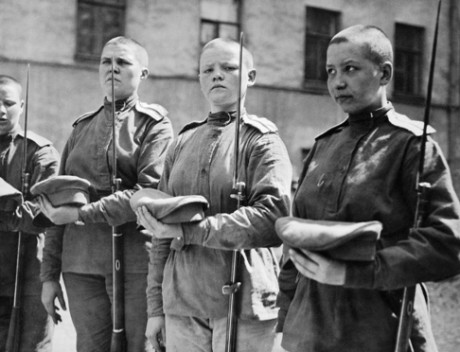
Mar 15 1917: Czar Nicholas II abdicates and provisional government appointed, which continues to support the war.
Apr 6 1917: The United States of America declares war on Germany.
Apr 7 1917: Glasgow Shed, Welsh Back, burns down in spectacular fire as it’s filled with sugar, wax, twine, roof felt and whisky.
Apr 9–May 17 1917: Second Battle of Arras. The British attack a heavily fortified German line without obtaining any breakthrough.
Apr 9–12 1917: Canadian victory at Vimy Ridge, part of the first phase of the Second Battle of Arras.
Apr 16–May 9 1917: The Second Battle of the Aisne (aka Nivelle Offensive) ends in French failure.
Apr 29–May 20 1917: Series of mutinies in the French army.
May 15 1917: Philippe Pétain replaces Robert Nivelle as Commander-in-Chief of the French Army.
Jun 7–14 1917: Second Battle of Messines. British recapture Messines Ridge.
Jun 13 1917: First heavy bomber raid on London.
Jun 20 1917: Bristol Watch Committee receives a 4,000 signature petition demanding enforcement of Sunday trading prohibition. Same meeting agrees to Chief Constable appointing a supervisor of women police officers at a salary of £200 pa.
Jun 25 1917: First American troops land in France.
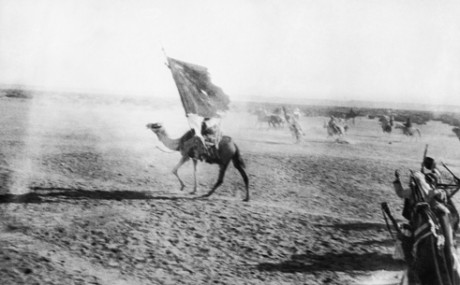
Jul 1–19 1917: Kerensky Offensive, last Russian initiative of war, ends in failure.
Jul 6 1917: Arab rebels led by Lawrence of Arabia seize the Jordanian port of Aqaba.
Jul 17 1917: Order in Council changes name of Royal Family to Windsor.
Jul 22 1917: Transport Workers Union meeting condemns unnecessary transport of food and speculation on food prices by shipowners. Meeting addressed by Ernest Bevin and Ben Tillett.
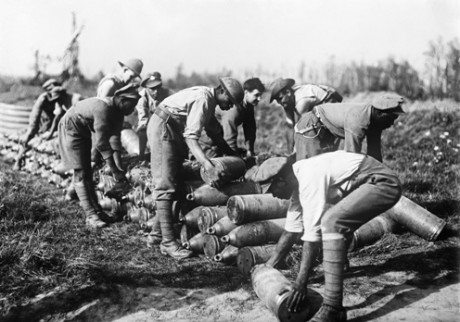
Jul 31 1917: The Third Battle of Ypres (aka Battle of Passchendaele) begins.
Aug 14 1917: Bristol Council sets up Local Food Committee in line with government policy, initially to run sugar rationing and control prices of meat and milk.
Aug 16 1917: Date of action for which Bristol-born Frederick Room, Royal Irish Regiment, awarded VC.
Aug 21 1917: Date of action for which Bristol-educated Hardy Parsons, Gloucestershire Regiment, posthumously awarded VC.
Sep 1917: Convoy system now in regular operation for merchant shipping.
Oct 1917: Bristol Tramways Co. strike – workers, including women, want improved wages, working hours and TU recognition. Lasts four days.
Oct 15 1917: Albert Cross shoots his wife on Platform 5 at Temple Meads in full view of dozens of witnesses after she had had an affair with another man while he was fighting overseas.
Oct 24–Nov 4 1917: Battle of Caporetto. The Austro-Hungarians and Germans break through the Italian lines. The Italian army is defeated and falls back on Piave River.
Nov 7 1917: Bolsheviks seize power in Russia’s October Revolution.
Nov 8 1917 : King and Queen visit National Shell Factory, St Philips, Wills Tobacco Ashton Gate, Council House, Durdham Down, aeroplane factory in Filton.
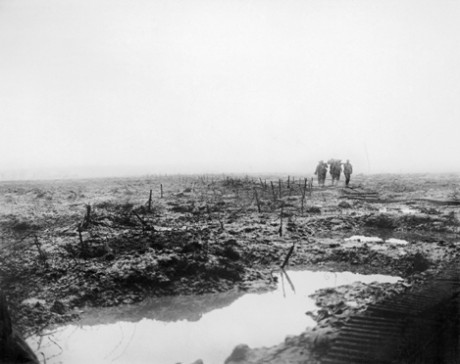
Nov 10 1917: The Third Battle of Ypres (Passchendaele) ends in stalemate.
Nov 16 1917: Transit Shed E at Avonmouth, filled with jute sacks, burns down, possibly because of spontaneous combustion among sacks.
Nov 17–Dec 30 1917: Battle of Jerusalem. The British enter the city Dec 11.
Nov 20–Dec 3 1917: First Battle of Cambrai. A British attack fails and the battle results in a stalemate.
Dec 10 1917: Visit by American Congregational minister Charles Monroe Sheldon, author of ‘In His Steps: What Would Jesus Do?’ and US and Canadian visitors calling for Prohibition. Rally at Colston Hall. Americans worry that US soldiers will fall victim to drink in UK.
Dec 22 1917: Concert at Colston Hall celebrates appointment of Alderman Frank Sheppard as city’s first Labour Lord Mayor (Nov 9). He’s presented with robes of office by trade unionists, and Ernest Bevin presents Mrs Sheppard with tea and coffee service also paid for by union members.
Dec 23 1917: Russia signs armistice with Germany.
Winter 1917: Worries about food shortages.
Image information: ‘His Majesty the King at investiture at Durdham Down November 8th 1917’ reproduced from Bristol and the Great War: 1914-1919 (1920), editors George F. Stone and Charles Wells. Bristol Record Office reference Bk/765, scanned by John Penny.
Russia's new Provisional Government continued the war, encouraging Russians including women (as seen here in the ‘Battalion of Death’) to fight on. Imperial War Museum/ Centenary Partnership Programme ref Q 106252.
T E Lawrence (‘Lawrence of Arabia’) took this action photograph of the Arabs capturing Aqaba on 6 July 1917. Imperial War Museum/ Centenary Partnership Programme ref Q59193T.
West Indian troops stacking 8-inch shells at a dump on the Gordon Road, Ypres, October 1917. Imperial War Museum/ Centenary Partnership Programme ref Q 1201.
Unusually heavy rain fell during the British offensive against the Passchendaele Ridge. Stretcher bearers, like these Canadians on 14 November 1917, struggled to bring back the wounded. Imperial War Museum/ Centenary Partnership Programme ref CO2252.
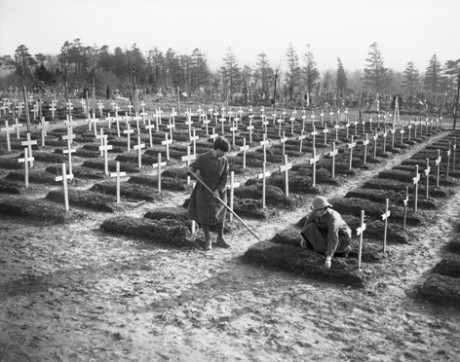
Events of particular relevance to Bristol area are shown in red.
Jan 4 1918: Hospital ship HMHS Rewa, headed for Avonmouth, torpedoed off Hartland Point. All saved aside from four men killed in explosion.
Jan 7 1918: Bristol Food Control Committee rations meat, butter, margarine and tea.
Jan 8 1918: Woodrow Wilson outlines his Fourteen Points.
Feb 1918: “Longest queue in Bristol’s history” for margarine distributed by Food Control Committee at Corn Exchange.

Feb 8 1918: Women’s Land Army march through Bristol to rally at Colston Hall.
Feb 21 1918: The British capture Jericho.
Feb 25 1918: Further rationing introduced.
Mar 3 1918: At Brest-Litovsk, Leon Trotsky signs peace treaty with Germany.
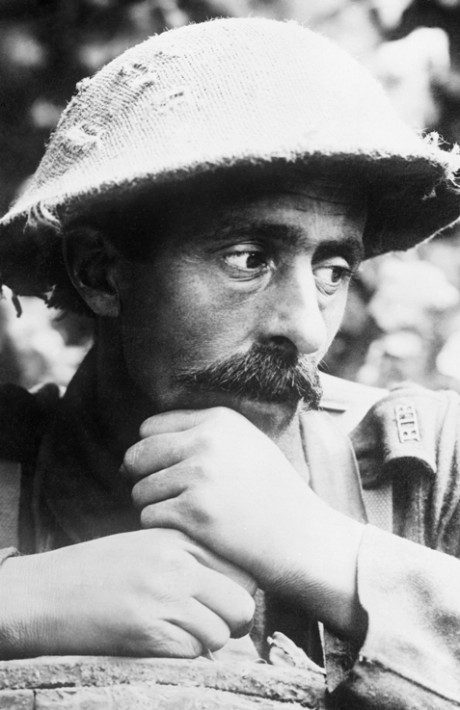
Mar 21–Apr 5 1918: Start of first German Spring Offensive, Operation Michael. (Kaiserschlacht/Ludendorff Offensive, lasts to July.)
Mar 21 1918: Date of action for which Bristol-educated Manley James, Gloucestershire Regiment, awarded VC.
Mar 26 1918: Marshal Foch appointed Supreme Commander of all Allied forces.
Apr 1 1918: Royal Air Force founded by combining the Royal Flying Corps and the Royal Naval Air Service.
Apr 8 1918: Docks Committee reports that all transit sheds at Avonmouth are full, chiefly with bacon, which is in serious danger of going off.
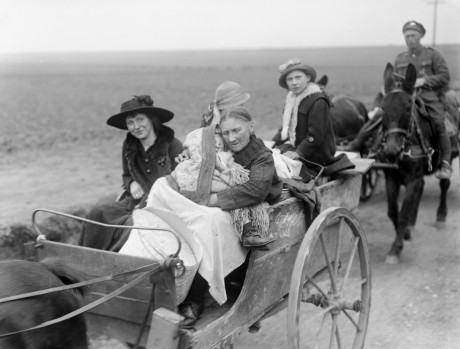
Apr 7–29 1918: Second phase of the German Spring Offensive, Operation Georgette.
May 1918: Lord Mayor opens new Dockers Union Hall in former picture house in East St, Bedminster. Ben Tillett and Ernest Bevin attend.
May 3 1918: Inaugural meeting of Bristol Women’s Citizens Association, non-political organisation to foster sense of citizenship among women and prove they can vote wisely.
May 15 1918: Sanitary Committee decrees street lights be turned off from this date to Aug 15 to save coal. Bristol Branch of National Society for Public Morals worries that this will lead to immorality.
May 27–Jun 6 1918: Third Battle of the Aisne (aka Operation Blücher-Yorck, third phase of the Spring Offensive). After initial gains, the German advance is halted.
Jun 1918: Manufacture of mustard gas begins, Chittening.
Jun 1918: John Henry Brown, carpenter employed by Cowlin & Son charged with self-mutilation to avoid military service after deliberately cutting off two fingers.
Jun 9–12 1918: Fourth phase of the Spring Offensive, Operation Gneisenau.
Jun 27 1918: Llandovery Castle hospital ship torpedoed with large loss of life: around 100 of the crew were from Bristol.

Jul 4 1918: Independence Day marked with service at Bristol Cathedral for US soldiers and sailors (Roman Catholics go to Pro Cathedral of the Holy Apostles), then lunch at Drill Hall followed by a march with British troops to Downs and tea at the Zoo. There is another big march and civic reception at the end of July.
Jul 14 1918: New rationing scheme introduced.
Jul 15–Aug 6 1918: Second Battle of the Marne and last German offensive on the Western Front. Fails when French counter-attack.
Jul 15–17 1918: Champagne-Marne Offensive (consisting of the Fourth Battle of Champagne and the Battle of the Mountain of Reims), last phase of the Spring Offensive and last German offensive of war.
Jul 17 1918: The Tsar and his family shot.
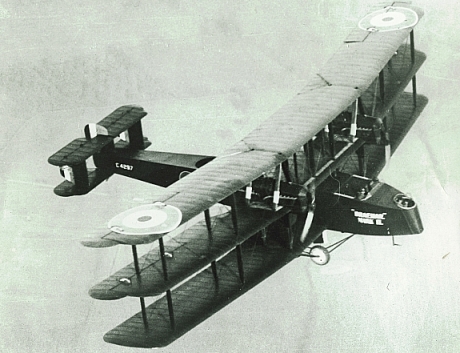
Aug 8–12 1918: Battle of Amiens, first phase of Allies’ Hundred Days Offensive.
Aug 13 1918: Maiden flight of Bristol Braemar triplane bomber, too late for the war effort and too big for peacetime use.
Sep 18 1918: Date of action for which Bristol-educated Daniel Burges, Gloucestershire Regiment, awarded VC.
Sep 18–Oct 17 1918: Battle of the Hindenburg Line, a phase of the Hundred Days Offensive. The Allies break through the German lines.
Sep 19–25 1918: Battle of Megiddo. British conquer Palestine.
Oct 1918: Influenza strikes Bristol. All schools closed from Oct 22 to 18 Nov.
Oct 1 1918: The British and Arab rebels enter Damascus.
Oct 13 1918: Date of action for which Harry Wood, Scots Guards, awarded VC: he is buried at Arnos Vale Cemetery.
Oct 20 1918: Germany suspends submarine warfare.
Oct 24–Nov 4 1918: Austro-Hungarian army defeated at Battle of Vittorio Veneto.
Oct 29 1918: Mutiny in German fleet.
Oct 30 1918: Ottoman Empire signs Armistice of Mudros.
Nov 9 1918: Germany: Kaiser Wilhelm II abdicates; republic proclaimed.
Nov 10 1918: Austria-Hungary: King-Emperor Karl I abdicates.
Nov 11 1918: At 6 a.m., Germany signs Armistice of Compiègne. End of fighting at 11 a.m.
Nov 14 1918: Fighting ends in East Africa when General von Lettow-Vorbeck agrees a cease-fire on hearing of Germany's surrender.
Nov 20 1918: A Congregational minister is invited to take part in Thanksgiving service at Bristol Cathedral, leaving to protests by some clergy.
Nov 21 1918: Germany's High Seas Fleet surrendered to the United Kingdom.

Dec 1918: German U Boats on display in City Docks.
Images information: Members of the Women’s Auxiliary Army Corps (WAAC) tend graves in Abbeville in France in February 1918. Imperial War Museum/ Centenary Partnership Programme ref CO2252.
‘Women's Land Army. Procession through Bristol, February 7th 1918’ reproduced from Bristol and the Great War: 1914-1919 (1920), editors George F Stone and Charles Wells. Bristol Record Office reference Bk/765, scanned by John Penny.
Between 21 March and 5 April, when German attention moved north to Flanders, 70,000 British soldiers were captured, like this man from the Royal Irish Regiment. Imperial War Museum/ Centenary Partnership Programme ref Q 23839.
A French family flees in April 1918 from Noeux-les-Mines, a town in northern France that had been relatively stable since September 1915. Imperial War Museum/ Centenary Partnership Programme ref Q 10898.
‘American Independence Day, July 4th 1918. Entertainment of American soldiers and sailors at Drill Hall, Old Market’ reproduced from Bristol and the Great War: 1914-1919 (1920), editors George F Stone and Charles Wells. Bristol Record Office reference Bk/765, scanned by John Penny.
Bristol Braemer tri-plane. Bristol Aero Collection.
‘German Submarine (U 86) in Floating Harbour’ (this U-boat had sunk the Llandovery Castle hospital ship) reproduced from Bristol and the Great War: 1914-1919 (1920), editors George F Stone and Charles Wells. Bristol Record Office reference Bk/765, scanned by John Penny.

Events of particular relevance to Bristol area are shown in red.
Jan 1919: Reported that 1,050 people in Bristol have died of ‘flu. Does not include number who died of related pneumonia.
Jan 8 1919: Entertainment mounted for returned POWS by British Red Cross in Bristol.
Jan 10 1919: 100 men of Royal Engineers march from White City camp to see Lord Mayor, protesting that they have jobs to go to but have not yet been demobbed.
Jan 18 1919: Peace Conference opens in Paris.
Jan 25 1919: Proposal to create the League of Nations accepted.
Feb 15 1919: Large numbers turn out to see 700 Belgian refugees leave. Remainder go two weeks later.
Feb 15 1919: P&A Campbell’s paddle steamer Albion returns to City Docks after wartime service, first of the White Funnel fleet to return home.
Apr 18 1919: Group of unemployed ex-servicemen march on Council House. Lord Mayor receives delegation.
May 20 1919: Investiture on College Green.
Jun 4 1919: Dr C Addison MP, President of the Local Government Board, cuts the first sod for new Sea Mills housing development.
Jun 21 1919: German High Seas Fleet (53 ships) scuttled in Scapa Flow with nine deaths, the last casualties of the war.
Jun 28 1919: Treaty of Versailles signed.

Jul 8 1919: Germany ratifies the Treaty of Versailles.
Jul 19 1919: Peace Day ceremonies and celebrations in Bristol and across the country.
Aug 18 1919: Date of action at Kronstadt Harbour for which Bristol-born Claude Dobson RN awarded VC.
Dec 1919: Tank presented to Bristol in ceremony at top of Blackboy Hill for the city’s part in raising money for War Loan.
Apr 15 1920: Earl Haig presented with the Freedom of the City of Bristol.
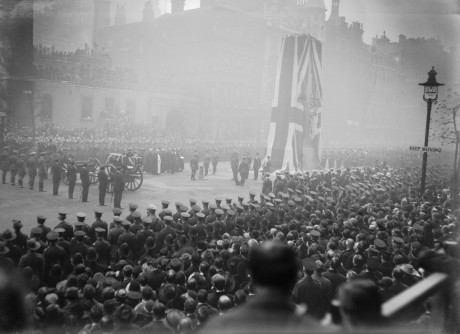
Nov 11 1920: Cenotaph in Whitehall, London unveiled.
Conflicts involving British troops since 1919
Jun 28 1922: Irish Civil War breaks out.
Feb 12 1927: British troops arrive in Shanghai to defend British nationals in Chinese Civil War.
Aug 24 1929: Britain declares martial law in Jerusalem.
Mar 1938: Prime Minister Neville Chamberlain pledges support for France and Belgium in wake of German occupation of Austria.
Sep 30 1938: Appeasement agreement with Germany following occupation of Czechoslovakia.
Feb 27 1939: Britain recognises Franco’s government following Spanish Civil War.
Aug 22 1939: Britain and France reaffirm pledge to protect Poland in wake of Nazi-Soviet pact.
Sep 1 1939: British forces mobilised, reserves called up, children evacuated from at-risk locations.
Sep 3 1939: Britain and France declare war on Germany following occupation of Poland.
May 22 1940: Internment of foreign nationals introduced.
May 27 1940: Evacuation of British troops from Dunkirk begins (ends Jun 4).
Jun 10 1940: Italy declares war on Allies.
Sept 7 1940: Start of Blitz bombing of major British cities including Bristol.
Jul 12 1941: Britain-Soviet pact formed in wake of German invasion of USSR.
Dec 8 1941: Britain and US declare war on Japan following Pearl Harbour attack.
Dec 18 1941: Unmarried women in their 20s called up to combat labour shortage.
Feb 15 1942: Surrender of Singapore to Japan.
Oct 31 1942: Success of El Alamein Offensive.
May 12 1943: German and Italian forces surrender in North Africa.
Jul 10 1943: British and American forces land in Sicily.
Sep 8 1943: Italy surrenders.
Dec 2 1943: Labour Minister Ernest Bevin (former Bristol dockworker) announces some conscripts will have to work in industry and mines (Bevin Boys).
Mar 1944: Combined British, Indian and Gurkha forces make successful attacks on Japanese in Burma.
Jun 6 1944: D-Day landings - Allied liberation of France begins.
May 7 1945: Victory in Europe Day.
Aug 18 1945: Victory over Japan Day.
Jul 22 1946: Bombing of King David Hotel by Zionist underground in Jerusalem - site of the central offices of the British Mandatory authorities of Palestine.
Jun 24 1948: Cold War: Berlin Blockade begins.
Apr 4 1949: North Atlantic Treaty signed, establishing NATO.
Jun 25 1950: North Korean troops cross the 38th Parallel beginning the Korean War.
Jun 29 1950: First British troops arrive in Korea.
Oct 19 1951: British troops seize Suez Canal.
Oct 19 1952: British troops sent to fight Mau Mau rebels in Kenya (Emergency ends 1960).
Jun 27 1953: Ceasefire between UN and North Korean/ Chinese forces in Korean War.
Oct 31 1956: British and French forces launch attack after Egypt fails to respond to ultimatum to leave Suez Canal – public opinion divided at home on British involvement.
Nov 7 1956: British forces hand over Suez Canal to UN having failed to topple Nasser and under pressure from US to withdraw.
Feb 1959: Peace agreement to end Cyprus Emergency (began Nov 26 1955).
Jul 31 1960: End of British involvement in the Malayan Emergency (began June 1948).
1962: British forces deployed in undeclared war between Indonesia and Malaysia.
Nov 30 1967: British troops leave Aden following insurgency by rebel groups.
Aug 14 1969: British troops deployed in Northern Ireland to protect Catholic population from Protestant attacks.
Sep 24 1971: 90 Russian diplomats expelled from Britain for spying as Cold War continues.
Mar 28 1972: Direct rule imposed on Northern Ireland.
Apr 2 1982: British troops deployed to Falklands following Argentinean invasion.
Jun 14 1982: Argentina surrenders to British at Port Stanley.
Aug 2 1990: Iraqi troops’ invasion of Kuwait leads to start of first Gulf War.
Feb 27 1991: First Gulf War ends.
Jun 26 1991: The first of the wars in the former Yugoslavia begins with the Ten-Day War in Slovenia.
Dec 14 1995: Dayton Peace Accord signed, ending the Bosnian Civil War.
Apr 10 1998: Northern Ireland Good Friday Agreement signed.
Jun 10 1999: End of Kosovo War.
Oct 7 2001: Operation Freedom launched by US and UK against Afghanistan.
Mar 20 2003: Start of the Iraq War with coalition invasion led by US.
Apr 30 2009: British troops formerly end combat operations in Iraq.
Images information: ‘The Lord Mayor (Alderman H W Twiggs) reading the proclamation of peace on the steps of the Council House, July 5th 1919’ reproduced from Bristol and the Great War: 1914-1919 (1920), editors George F Stone and Charles Wells, Bristol Record Office reference Bk/765, scanned by John Penny.
‘Peace Day Celebration, July 19th 1919: Bristol Police Passing the Saluting Point’ ’reproduced from Bristol and the Great War: 1914-1919 (1920), editors George F Stone and Charles Wells, Bristol Record Office reference Bk/765, scanned by John Penny.
On 11 November 1920, King George V unveiled the Cenotaph in Whitehall (shown here) to commemorate the fallen, before leading mourners to Westminster Abbey to bury the Unknown Warrior. Imperial War Museum/ Centenary Partnership Programme ref Q 14965.
